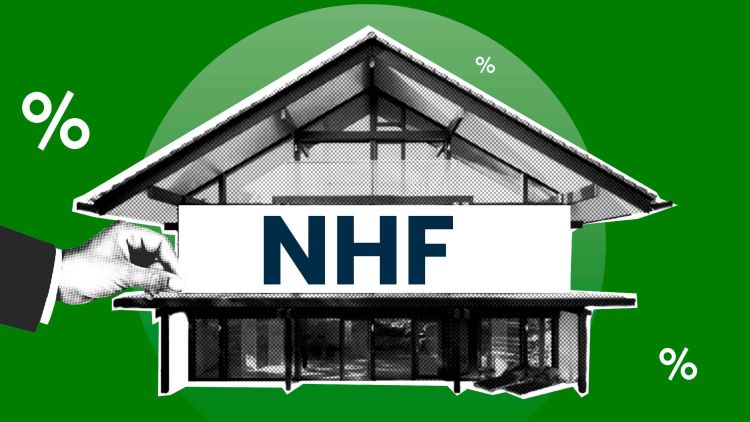Is the National Housing Fund a mirage?
 By Femi Ogunshola
By Femi Ogunshola
Established by Act 3 of 1992 established the National Housing Fund (NHF) is meant to mobilise funds for the provision of affordable residential houses for Nigerians.
It is expected that commercial and merchant banks would invest 10 per cent of their loans into the portfolio.
Also insurance companies were projected to invest 20 per cent of 40 per cent of life funds in the housing sector with 50 per cent of the investment being directly in funds.
Similarly, the Federal Government would make additional financial contributions.
With a pool of funds created by the contributors, including 2.5 per cent monthly basic salary deductions, the fund becomes available to any contributor to borrow from, after contributing for a maximum of six months.
In a nutshell, this is NHF on paper. In reality, however, the story seems to be somewhat different.
The News Agency of Nigeria (NAN) sampled opinions of workers across Ministries and they were of the view that the scheme has not benefited most of them.
This was corroborated by the leadership of President of Nigeria Labour Congress (NLC).
When Mr Joe Ajaero, the leader of organised labour in the country appeared before the House of Representatives ad hoc committee on NHF he decried the inability of workers to access the fund.
The committee is probing Non-Remittance to the NHF and Utilisation of the funds from 2011 till date
Ajaero said it was unfortunate that in spite making the statutory contributions of 2.5 per cent of annual salary to the NHF, many workers are unable to access the loan due to administrative bottlenecks.
According to him the Act provides for 90 days from the date of application for the loan to disbursement.
However, the experience of many workers is `horrific` as the undue delay in approving the loans force many workers to abandon the pursuit of the loan.
He said in some cases, loan applicants are forced to resort to third parties in an attempt to fast track their application.
According to labour leader, this creates the perception that the scheme is corrupt and alleges statutory bottlenecks that make it difficult for workers to access housing loans.
Top on this, according to him, is the requirement for the provision of land title, especially in the form of Certificate of Occupancy (C of O), before a worker can access housing loan.
Ajaero likened the process of getting C of O in Nigeria to the Biblical camel passing through the eye of a needle.
According to him, the challenge is endemic given the chaos in land administration in Nigeria as many states are yet to fully digitalised geophysical information services to aid seamless release of C of Os.
Some concerned civil servants describe NHF as a scam.
Emmanuel Bamiyo, a Grade Level 12 officer in one of the Federal Government Agencies said his NHF monthly deduction stands at N3200, ditto, while Mrs Kolade Tosin, a civil servant on level 13, gets a monthly NHF deduction of N3,648.
The questions agitating the minds of many is whether NHF has truly served its purpose given the monthly deductions from civil servants.
Mr Ifeanyi Okonkwo, an insurance broker said public perception and experiences with the NHF is quite unsavoury as many civil servants have not been able to access the loans due to one bureaucratic bottleneck or another.
He alleged lack of transparency, and the scheme’s inability to deliver on its mandates in spite huge sums of money in its kitty.
According to the Head of the Civil Service of the Federation, Dr Folasade Yemi-Esan there are 69,854 core civil servants receiving salaries under Integrated Personnel Payroll System (IPPS).
She said, so far they have registered about 205,411 officers that are non MDAs and 69,854 others in the core MDAs, bring the total number of IPPS enrolees to 275, 265 personnel.
This number gives an insight into the amount of money raked in monthly under NHF.
Mr Madu Hamman, the Managing Director, FMBN said NHF has defended the scheme saying NHF NHF is not a revenue to the bank but a deposit liability, as it makes refund to contributors with interest.
“Every worker is expected to remit 2.5 per cent of his/her monthly income to the scheme and after consistent contribution for six months, become eligible to apply for various loans and advances towards home ownership including a mortgage loan up to N50 million,’’ he said.
He said aside addressing the problem of shortage of long-term funding for affordable housing delivery in the country it is targeted at low and medium income earners.
Hamman also blamed IPPS for the scheme’s shortcomings, saying it did not remit N26.6 billion of workers contributory funds in two years.
He spoke during an appearance before the House of Representatives ad hoc committee probing the non-remittance to the National Housing Fund (NHF) and Utilisation.
But Ajaero insists that the scheme has not met the housing needs of workers and their millions of dependants.
Ajaero called for relaxing the process of reimbursing retired workers their contributions into the scheme, adding that it takes several months if not years for retirees who are not serving any loan under the scheme to get their refunds. (NANFeatures)
News Agency of Nigeria (NAN).











